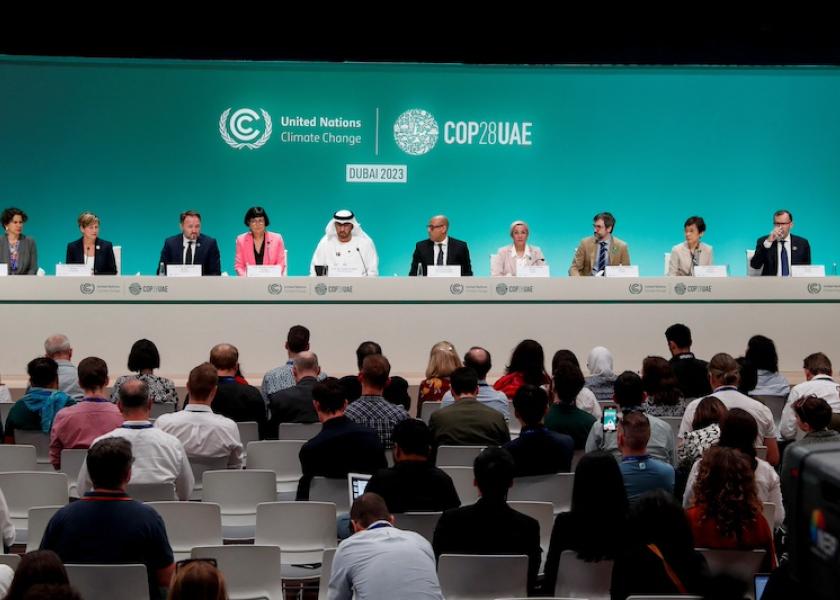USDA Secretary Tom Vilsack Reveals the Final COP28 Declaration Will Not Focus on Agriculture and Food

Despite calls from countries to focus on food and agriculture as a way to meet the world's climate goals, USDA Secretary Tom Vilsack revealed that the final COP28 declaration would not focus on agriculture and food. This decision was influenced by a request from the G77 group of developing countries for additional review and participation related to agriculture and food, leaving no time for negotiations.
While Vilsack highlighted the importance of a special day dedicated to agriculture and food policy and the participation of U.S. farm and food leaders, he considered the Emirates Declaration on Sustainable Agriculture, Resilient Food Systems, and Climate Change, signed by 152 nations, and commitments by countries and companies to reduce greenhouse gas emissions and fund related projects as significant achievements. However, some observers were disappointed because this would delay progress until June 2024.
Today, at the first-ever day dedicated to food and agriculture at a COP conference, we’re proud to highlight the steps we’re taking to tackle the climate crisis, invest in food systems innovation, and bring new opportunities to producers #COP28 pic.twitter.com/69uyWVdmcZ — Secretary Tom Vilsack (@SecVilsack) December 10, 2023
Vilsack mentioned the Agriculture Innovation Mission (AIM) for Climate, a joint initiative between the U.S. and the United Arab Emirates aimed at addressing climate change and global hunger through increased investment in climate-smart agriculture and food systems innovation.
Regarding reducing meat consumption, Vilsack said he had not heard much about that goal but instead emphasized strategies for reducing methane emissions related to livestock. The U.S. is taking a leadership role in methane reduction through research, feed additives, recapturing methane for energy production, and managing manure.
A Focus on Dairy to Start
Leading into the meeting, there was a lot of talk about how agriculture practices and food production may be impacted by the climate goals. And to start the meeting, dairy was on the list.
According to a report from Reuters last week, advocacy groups said that tackling livestock methane should be a major priority at this year's COP28 summit. In addition, at the summit in Dubai this week, six of the world’s largest dairy companies announced an alliance to cut methane emissions from dairy cows.
Reuters reported members of the Dairy Methane Action Alliance include Danone, Bel Group, General Mills, Lactalis USA, Kraft Heinz and Nestle. The Alliance says it will begin reporting their methane emissions by mid-2024 and will write methane action plans by the end of that year.
While the world's largest dairy companies are working together, it's also sparking an argument of how essential dairy is in the diets of people around the globe.
#UN #Roadmap to 1.5 #Livestock plan unveiled at #cop28 listed in this thread.
Livestock plays a crucial economic role contributing to the livelihoods of about 1.7 billion poor people and 70 percent of those employed in the sector are women — Steven Middendorp (@smiddendorp22) December 10, 2023
Cop28: An Explanation
What is COP28? It's a meeting of politicians, diplomats, NGOS and representatives of national governments. There are also other stakeholders who attend to try to influence the outcome. The meeting actually dates back to June of 1992 when 154 countries signed the United Nations Framework Convention on Climate Change (UNFCCC). At the time, those countries agreed to combat human impacts on the climate.
COP meetings have been held every year since, with a different country becoming the COP president. Since that country is in charge of organizing the meeting, the host city typically moves year to year. Then, any new agreements struck from that year's meeting, is typically named after the host city, such as the 2015 Paris Agreement and the 2021 Glasgow Climate Pact.
According to the COP28 website, the goal is to "correct course and accelerate action to tackle the climate crisis." The website also states, "COP28 is where the world will take stock of progress on the Paris Agreement – the landmark climate treaty concluded in 2015 – and chart a course of action to dramatically reduce emissions and protect lives and livelihoods."
The Goal
According to COP28 organizers, the science shows "to preserve a livable climate, the production of coal, oil, and gas must rapidly decline, and global renewable power capacity – including wind, solar, hydro and geothermal energy – needs to triple by 2030. At the same time, financing for adaptation and investments in climate resilience need a quantum leap."
COP28 organizers say the goal is to create "concrete solutions to the defining issue of our time."







